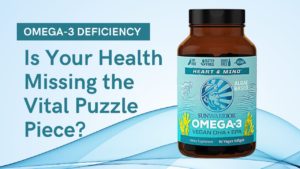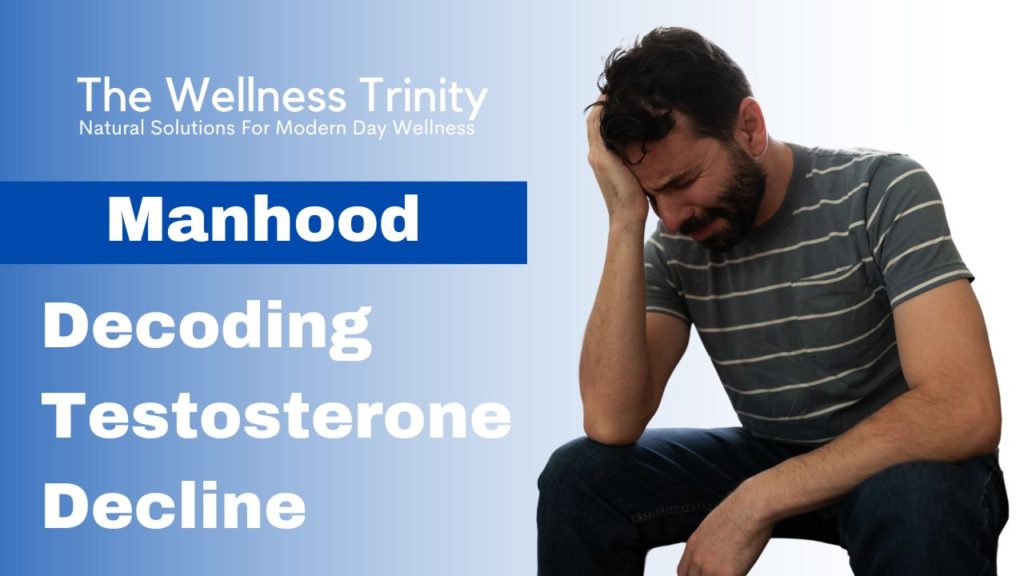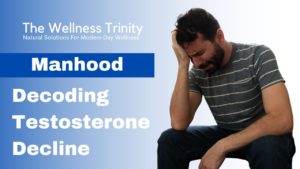
Omega-3 Deficiency: Is Your Health Missing the Vital Puzzle Piece?
In the vast landscape of nutrition, one essential element often overlooked is omega-3 fatty acids. Comprising DHA (docosahexaenoic acid), EPA

| Testosterone is a hormone primarily produced in the testicles in men (and to a lesser extent in the adrenal glands). It belongs to a class of hormones known as androgens. Testosterone plays a central and multifaceted role in male health, influencing a wide range of physiological and psychological aspects. Physical Well-Being: 1. Muscle Mass and Strength: Testosterone is a key driver of muscle growth and maintenance. It helps build and repair muscle tissues, contributing to physical strength and endurance. 2. Bone Density Testosterone supports the development and maintenance of bone density. Low testosterone levels can increase the risk of osteoporosis and bone fractures. 3. Body Fat Regulation Adequate testosterone levels help regulate fat distribution in the body. Low testosterone is associated with an increase in body fat, particularly in the abdominal area. 4. Sexual Health Testosterone is crucial for the development of male sexual characteristics, including the growth of facial and body hair, the deepening of the voice, and the development of the male genitalia. It also plays a central role in sexual function and libido. Mental Well-Being: 1. Mood and Emotional Balance: Testosterone influences mood and emotional well-being. Low levels of testosterone have been linked to increased irritability, mood swings, and even depression in some men. 2. Cognitive Function: There is evidence to suggest that testosterone is involved in cognitive processes such as memory, attention, and spatial abilities. Some studies have shown that optimal testosterone levels may support cognitive function. 3. Energy and Vitality: Testosterone is often associated with increased energy levels and a sense of vitality. Low testosterone can lead to fatigue and reduced motivation. 4. Sleep Quality: Testosterone has an impact on sleep patterns, and disturbances in sleep can, in turn, affect testosterone production. It’s a complex interplay. In essence, testosterone is a cornerstone of male health, affecting not only physical attributes but also emotional and cognitive aspects of well-being. Understanding the importance of maintaining healthy testosterone levels is vital for men of all ages, as it can significantly influence their overall quality of life and longevity. The Decline in Testosterone Levels Over the Past Decade Over the past decade, numerous studies and research reports have highlighted a concerning trend of declining testosterone levels in men across different age groups. While the exact magnitude of decline can vary based on populations and methodologies, the overall trend is unmistakable. 1. A Global Downward Trend: A comprehensive meta-analysis published in the Journal of Clinical Endocrinology & Metabolism in 2007 found that average testosterone levels in men have been declining by approximately 1% per year over the past two decades. This suggests a substantial decrease in testosterone levels over the past decade alone. 2. Age-Related Decline: Testosterone naturally declines with age, but recent studies have shown that even when accounting for age, the decline is steeper than in previous generations. For instance, a study published in the Journal of Clinical Endocrinology & Metabolism in 2017 revealed that average testosterone levels in men have dropped by 15% over the last two decades. 3. Younger Men Affected: It’s not just older men who are experiencing this decline. Research published in the Journal of Urology in 2020 reported a significant drop in testosterone levels in young men aged 18 to 39 over the past decade, with a 20% decline in average levels. The Seriousness of the Issue: The declining testosterone levels in men are a matter of serious concern due to their far-reaching implications for health and well-being: 1. Fertility Concerns: Low testosterone levels can affect sperm production, potentially leading to fertility issues in men. This is a significant concern for those planning to start families. 2. Physical Health Risks: Lower testosterone levels are associated with increased risks of cardiovascular disease, type 2 diabetes, and obesity, among other health conditions. These health risks can lead to a decreased quality of life and a higher burden on healthcare systems. 3. Mental Health Impact: Mood disorders, such as depression and anxiety, are linked to low testosterone levels. These conditions not only affect an individual’s emotional well-being but can also impact their relationships and overall quality of life. 4. Reduced Quality of Life: Declining testosterone levels can lead to fatigue, reduced muscle mass, diminished libido, and cognitive issues. These factors combined can significantly reduce a man’s quality of life. 5. Economic Impact: The decline in testosterone levels can have economic implications, as it may lead to increased healthcare costs and decreased workforce productivity. Factors Contributing to Decreasing Testosterone Levels 1. Lifestyle Changes: – **Diet:** Research suggests that poor dietary choices, such as a diet high in processed foods, sugar, and unhealthy fats, can contribute to lower testosterone levels. On the other hand, diets rich in nutrients like zinc, vitamin D, and omega-3 fatty acids are associated with healthier testosterone levels. – Exercise: Physical inactivity and a sedentary lifestyle are linked to lower testosterone levels. Regular physical activity, especially resistance training and high-intensity interval training (HIIT), can help maintain or boost testosterone. – Sleep: Inadequate sleep disrupts hormonal balance, including testosterone production. Studies show that chronic sleep deprivation can lead to decreased testosterone levels. 2. Environmental Factors: – **Pollution:** Exposure to environmental pollutants, including heavy metals like lead and cadmium, as well as air pollutants, can interfere with testosterone production. Research has shown that men living in areas with high pollution levels tend to have lower testosterone levels. – Endocrine Disruptors: Chemicals found in plastics, pesticides, and some personal care products can act as endocrine disruptors, interfering with the endocrine system, including testosterone regulation. These compounds, such as phthalates and BPA, are a growing concern. 3. Psychological Stress: – Cortisol and Stress Hormones: Chronic stress leads to increased cortisol production, which can suppress testosterone production. Studies have demonstrated a negative correlation between cortisol levels and testosterone levels in stressed individuals. – Psychological Stress: High-stress levels can also lead to emotional issues like anxiety and depression, which are associated with lower testosterone levels. 4. Aging: – Natural Decline: It’s important to note that aging itself is a natural factor contributing to declining testosterone levels. Testosterone production tends to decrease gradually starting around the age of 30, and this decline continues with age. – Hormone Imbalance: Aging can lead to imbalances in hormones, such as an increase in sex hormone-binding globulin (SHBG), which binds to testosterone and reduces its bioavailability. Relevant Research Findings and Insights: – Diet: A study published in the “Journal of Steroid Biochemistry and Molecular Biology” in 2017 found that dietary factors like vitamin D, zinc, and certain fatty acids positively influence testosterone levels. Conversely, diets high in sugar and processed foods are associated with lower testosterone. – Exercise: Research published in the “Journal of Clinical Endocrinology & Metabolism” in 2012 showed that resistance training can significantly increase testosterone levels. Regular physical activity, including resistance exercises, can help counteract the age-related decline. – Sleep: Inadequate sleep can lead to reduced testosterone levels. A study published in “The Journal of the American Medical Association” in 2011 found that even a week of sleep restriction can significantly lower testosterone levels in young men. – Pollution and Endocrine Disruptors: Research published in “Environmental Health Perspectives” in 2016 highlighted the detrimental effects of endocrine-disrupting chemicals on male reproductive health, including testosterone disruption. –Stress: Chronic stress and elevated cortisol levels have been consistently linked to lower testosterone levels. A study published in “Psychoneuroendocrinology” in 2019 demonstrated the negative impact of chronic stress on testosterone in men. – Aging: The natural decline in testosterone with age is well-documented. A study in the “Journal of Clinical Endocrinology & Metabolism” in 2007 showed that total testosterone levels decrease by approximately 1% per year in aging men. Understanding these contributing factors and their impact on testosterone levels is crucial for individuals looking to maintain or improve their hormone health. Lifestyle modifications, environmental awareness, stress management, and regular health check-ups can all play a role in addressing declining testosterone levels and mitigating associated health risks. Impact of Declining Testosterone Levels on Men’s Health 1. Reduced Muscle Mass and Strength: – Muscle Atrophy: Declining testosterone levels can contribute to muscle atrophy, or the loss of muscle mass. This can result in reduced strength and physical performance. – Difficulty in Building Muscle: Lower testosterone levels may make it more challenging for men to build and maintain lean muscle mass, even with regular exercise. – Increased Fat Mass: In contrast, reduced muscle mass can lead to an increase in body fat, particularly around the abdomen. This shift in body composition can negatively affect overall health. 2. Increased Risk of Cardiovascular Disease: – Atherosclerosis: Low testosterone levels have been linked to the development of atherosclerosis, a condition characterized by the buildup of plaque in arteries. This can lead to an increased risk of heart disease, heart attacks, and strokes. – High Blood Pressure: Testosterone plays a role in regulating blood pressure. A decline in testosterone can contribute to higher blood pressure, which is a risk factor for cardiovascular issues. 3. Mood Disorders and Cognitive Decline: Mood Swings: Low testosterone levels are associated with mood swings, irritability, and even depression in some men. Hormonal imbalances can affect neurotransmitter function in the brain. – Cognitive Function: There is evidence to suggest that testosterone is involved in cognitive processes such as memory, attention, and spatial abilities. Declining testosterone levels may contribute to cognitive decline and difficulties with focus and memory. 4. Sexual Health Issues – Erectile Dysfunction: Testosterone plays a crucial role in sexual function. Low testosterone levels can lead to erectile dysfunction, making it difficult for men to achieve or maintain an erection. – Reduced Libido: A decline in testosterone levels often results in reduced sexual desire or libido. This can impact sexual satisfaction and overall quality of life. – Fertility: Low testosterone can affect sperm production and quality, potentially leading to fertility issues. It’s important to note that the impact of declining testosterone levels on men’s health can vary from individual to individual. Some men may experience more pronounced effects, while others may have fewer noticeable symptoms. Additionally, the rate and extent of testosterone decline can be influenced by genetics, lifestyle factors, and overall health. Addressing declining testosterone levels often involves lifestyle modifications, hormone replacement therapy when necessary, and regular medical check-ups. Consulting a healthcare professional is crucial for men experiencing symptoms related to low testosterone, as they can provide personalized guidance and treatment options to improve overall health and well-being. Conclusion: In conclusion, let’s recap the key takeaways from our exploration of declining testosterone levels: – Testosterone is a vital hormone for men, influencing both physical and mental well-being. – There is clear evidence of a decline in testosterone levels over the past decade, posing significant health risks. – Lifestyle factors, environmental pollutants, stress, and aging all contribute to this decline. The data and statistics clearly indicate a significant and concerning decline in testosterone levels in men over the past decade. The seriousness of this issue extends beyond just the individual and can have far-reaching implications for public health and society as a whole. Understanding the factors contributing to this decline and taking proactive measures to address it is paramount for men’s health and well-being in the years to come. We urge you to prioritize your health and well-being, as it forms the foundation of a fulfilling life. Your journey toward optimal health begins with understanding the factors affecting your testosterone levels and taking proactive steps to address them. We are committed to supporting you on this journey. Our T FORCE PRO offers a comprehensive solution to help you maintain healthy testosterone levels. By supplementing and monitoring your levels regularly, you can take control of your hormone health and overall vitality. If you have any questions or concerns about testosterone levels, or if you’re interested in our T FORCE PRO, please don’t hesitate to reach out to us. Your health is our priority, and we’re here to provide personalized guidance and support. To monitor your testosterone levels and take the first step towards optimizing your health, visit our testing page HORMONE TESTING]. Together, we can ensure that you have the knowledge and tools needed to thrive in good health. |
Introducing the T-FORCE PRO – Your Ultimate Testosterone Powerhouse! Unleash Your Inner Strength! Boost Testosterone Naturally! Unleash Your Inner Strength! Boost Testosterone Naturally! Elevate Your Mood and Confidence! Elevate Your Mood and Confidence! Support Testicular Health for Peak Performance! Support Testicular Health for Peak Performance! Enhance Sperm Health and Fertility! Enhance Sperm Health and Fertility! Safeguard Your Prostate for Long-Term Well-Being! Safeguard Your Prostate for Long-Term Well-Being!Experience the transformation you’ve been waiting for with T-FORCE PRO. It’s not just a supplement; it’s your ticket to a vibrant, confident, and healthier you. Don’t wait – supercharge your vitality and reclaim your peak performance today!  Discover the power of personalized health with our cutting-edge hormone testing!  Monitoring your testosterone levels is not just essential; it’s a game-changer for your well-being. Monitoring your testosterone levels is not just essential; it’s a game-changer for your well-being.   From optimizing your fitness gains to enhancing your mood and vitality, knowing your hormonal balance is the key to unlocking your full potential. Take control of your health journey and thrive with confidence. Don’t wait; start monitoring your testosterone levels today for a healthier, happier you! From optimizing your fitness gains to enhancing your mood and vitality, knowing your hormonal balance is the key to unlocking your full potential. Take control of your health journey and thrive with confidence. Don’t wait; start monitoring your testosterone levels today for a healthier, happier you!   |

Founder of The Wellness Trinity and Cerebral Detox Program

In the vast landscape of nutrition, one essential element often overlooked is omega-3 fatty acids. Comprising DHA (docosahexaenoic acid), EPA

Revitalize Your Heart: Unleashing Nature’s Harmony with Cardio Support Explore the nuanced benefits of More Than Cardio Support, a thoughtfully

Unlocking the power of Folvic 400x for your body Fulvic 400X, a naturally occurring organic compound derived from soil, sediment,

Testosterone is a hormone primarily produced in the testicles in men (and to a lesser extent in the adrenal glands).
THE STATEMENTS AND PRODUCTS ON THIS WEBSITE ARE NOT INTENDED TO DIAGNOSE, TREAT, MITIGATE, CURE OR PREVENT ANY DISEASE.
We do the research so you don’t have to. Stay in the know with the latest in health and wellness